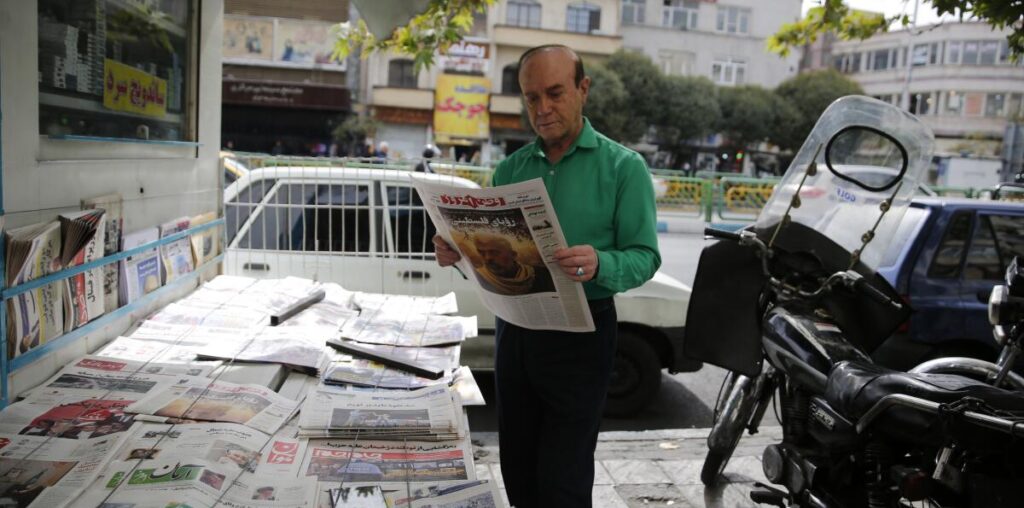Israel’s retaliatory bombardment of Iran on Saturday appeared to be limited in scope, but Western nations including the U.S. warned another spark could swiftly ignite a new and dangerous round of Middle East escalation.
Israel early Saturday declared mission accomplished after three waves of pre-dawn airstrikes hit military targets, including missile batteries and production facilities, near Tehran. Iran sought to downplay the damage and said only four soldiers were killed.
Iran appeared to downplay the strikes as life in Tehran, the capital and other cities seemed to return to normal Saturday, after a noisy night of exploding munitions. People sat in cafes, children went to school and traffic was routine, but with long lines at gasoline stations. The Iranian news agency FARS published photos of a “bustling” bazaar in the capital amid other attempts to show calm.
By limiting its attacks to military targets, Israel may have been heeding entreaties by the Biden administration to avoid Iran’s oil fields and nuclear research facilities as a way to temper any Iranian retaliation.
“This should be the end of this direct exchange of fire between Israel and Iran,” a senior Biden administration said in a briefing with reporters after Israel declared the overnight operation to have been completed. “If Iran chooses to respond once again, we will be ready, and there will be consequences for Iran once again. However, we do not want to see that happen.”
Israel’s bombardment of Iran came in response to Iran launching nearly 200 ballistic missiles at Israel on Oct. 1 — and that attack was in retaliation for Israel’s killing of senior leaders of the Iranian-backed militant groups Hezbollah in Lebanon and Hamas in the Gaza Strip.
“I am clear that Israel has the right to defend itself against Iranian aggression,” British Prime Minister Keir Starmer said Saturday. “I am equally clear that we need to avoid further regional escalation and urge all sides to show restraint.”
Yet containing wider conflict has become ever more difficult.
Fury throughout the region over Israel’s killing of tens of thousands of Palestinians in Gaza remains intense — and the anger is growing as Israel expands its operations into Lebanon, bombarding cities and sending troops into the country’s south.
Just over a year ago, Hamas militants crossed the border from Gaza and attacked southern Israel, killing about 1,200 people and seizing around 250 hostages. In response, Israel launched an operation that has decimated the Gaza Strip and displaced some 90% of its population.
The day after Hamas’ Oct. 7, 2023, attack, Hezbollah started firing rockets and missiles into northern Israel, and in the last year it drove some 70,000 Israelis from their towns. After Israel escalated bombardments and launched a ground invasion in late September, more than 2,000 Lebanese have been killed and a million displaced, according to the Lebanese health ministry.
Israel says its military campaigns target militants who have killed Israelis and who often hide in hospitals, schools or other civilian structures, but the Biden administration and others say the high civilian toll of deaths and injuries is “unacceptable.”
The fear looming behind the exchanges between Israel and Iran is that the United States could eventually be drawn into a regional war. That is a development that neither the U.S. nor Iran wants, analysts say.
The U.S., in the middle of a presidential election, is loathe to take on yet another foreign conflict. Washington is already extended, primarily with money and weapons, as it supports Ukraine against Russia’s invasion and Israel against Hamas and Hezbollah — two of the Iran-backed factions that have made it possible for Tehran to fight its archenemy Israel by proxy.
Iran would rather avoid direct warfare for a variety of reasons. The country has not endured full-fledged war on its soil since its disastrous fight with Iraq in the 1980s, and trauma from that conflict, which claimed tens of thousands of lives, lingers today. A war with the U.S. — or Israel — would be unwinnable, experts say.
More concretely, Iran is struggling with widespread domestic discontent, repression of dissent and a weak economy battered by U.S. and other international sanctions. After the Oct. 1 ballistic attack on Israel, the European Union went so far as to sanction the Iranian airline, making it impossible to land flights in most European destinations.
Iran also is calculating between saving face by standing up to Israel while also hoping to minimize antagonizing the West as it seeks relief from sanctions and possibly a reopening of negotiations over the international Iran nuclear deal, drafted and signed by President Obama and six other world powers but jettisoned by President Trump.
Moreover, Iran’s priority is the survival of its government and system above all else, analysts say.
Sanam Vakil, a Middle East analyst at Chatham House in London, said Iran will be reluctant to openly attack Israel now because its own military prowess and reputation have suffered blows in recent weeks. (Most of the ballistic missiles it hurled at Israel were intercepted and damage was minimal.)
Instead, Tehran will shift focus to Gaza as a rallying point, and where nearly a year of U.S.-led efforts have failed to broker a ceasefire, and will use its diplomatic arm to attempt to deepen Israel’s isolation, Vakil said.
Despite those factors, the moment remains volatile and fraught, she said.
“What is clear is that both Israel and Iran are in reactive mode and the terms and conditions of their long adversarial relationship have been redefined,” Vakil said on the social media platform X. “Without guardrails, red lines or a strategy to de-escalate, further conflict remains in the cards.”
On Saturday, there were a handful of bombastic comments coming from Iranian hardliners, but not from Iranian leaders. Instead, the Foreign Ministry issued a statement said it was “entitled” to self-defense but did not make threats.
Iran “considers itself entitled and obligated to defend against foreign acts of aggression,” the statement said.

